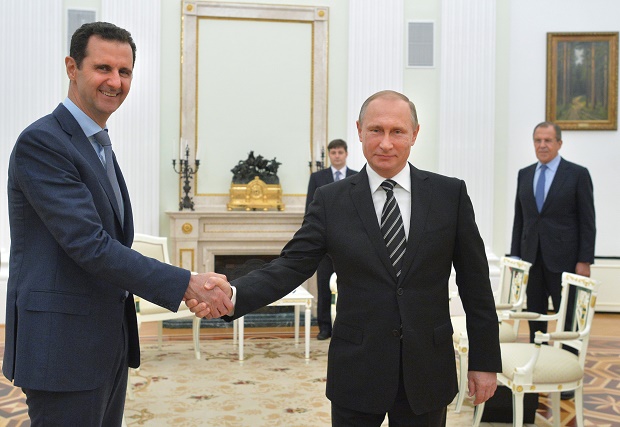Nations face tough question: Who are Syria’s terrorists?

In this file photo taken on Tuesday, Oct. 20, 2015, Russian President Vladimir Putin, center, shakes hand with Syrian President Bashar Assad as Russian Foreign Minister Sergey Lavrov, right, looks on in the Kremlin in Moscow, Russia. Iran sits down with the United States, Russia, Europeans and key Arab states for the first time since the Syrian civil war began to discuss the future of the war-torn country. It will also break ground by bringing Assad’s main supporter, Iran, to the same table as its regional rivals, including Turkey and Saudi Arabia, who have been backing many of the insurgent groups. AP FILE PHOTO
WASHINGTON — One nation’s terrorist may be another’s freedom fighter.
But for the sake of peace, the United States, Russia, Saudi Arabia and Iran will try this weekend to agree on which of Syria’s fighting forces are common enemies and which can be included in a transition government with President Bashar Assad, their intractable enemy.
Failure to reach an agreement could leave international peace efforts in tatters.
As diplomats return to Vienna for another round of Syria talks on Saturday, they’re grappling with questions that have scuttled all previous attempts to forge a ceasefire and usher in a political transition:
Other than the Islamic State group, who are the terrorists? Who from Syria’s government and opposition should do the negotiating? How long can Assad remain in power?
Through more than four years of brutal civil war, world and regional powers have waged bitter public relations battles over these matters while providing military equipment or even directly intervening to support Syria’s opposing camps. Assad’s army is now backed by Iran’s hardline Quds Force and its proxy, Hezbollah, along with Russia. The rebels include Western-backed “moderates” and Arab-supported Islamist groups, as well as al-Qaida-linked militias. In the mix is the Islamic State, opposed by all, in principle.
Over the last couple of weeks, countries have been trading lists of who they consider terrorists. No common understanding has been reached.
“We face an environment now that bears little resemblance to the kind of black-white scenarios that make decisions relatively easy,” US Secretary of State John Kerry said in a speech on Syria Thursday. “Put simply, there are bad guys all around and good guys who are not accustomed to working with each other.”
Searching for a diplomatic path forward, Kerry and other US officials have tamped down demands for Assad’s quick departure and allowed Iran — whom they call the world’s leading state sponsor of terrorism — to join the mediation process.
By doing so, Washington has accepted that Tehran can continue wielding influence over Syria, which it has relied on for decades to project power throughout the Middle East. That includes arming anti-Israel and anti-US forces Hamas and Hezbollah, which the US considers terrorist organizations. The shift has occurred although the Obama administration vowed to “redouble” efforts to counter Iran’s regional ambitions.
It’s unclear what the US and Saudi Arabia, Iran’s Mideast rival, are getting in return. A draft Russian settlement leaked this week says the UN Security Council would endorse the fight against the Islamic State, but that nations must still “agree on the additional list of terrorist groups.” These groups wouldn’t be covered by a ceasefire.
That could be the rub. Assad has bombed militants and civilians alike, labelling almost anyone who opposes him a terrorist. Western nations say the Russians have mainly bombed moderate forces as part of its “counterterrorism” campaign. Even the US and its allies disagree: Whereas Washington avoids the more Islamist opposition militias like Ahrar ash-Sham, Arab states such as Saudi Arabia and Qatar readily back them.
A resolution will “require deep breaths from all sides,” British Foreign Secretary Philip Hammond said this week in Washington, suggesting significant compromise on the terrorism label is necessary.
Kerry said he didn’t know if a political transition was reachable yet, but emphasized: “We have a responsibility to do everything we can, for as long as we must.”
More than 250,000 people have been killed in the Syrian war. Eleven million have been uprooted from their homes. The conflict has allowed Islamic State militants to carve out significant parts of Syria and Iraq for their would-be caliphate and commit atrocities, particularly against women and minorities, that some human rights groups consider genocide. Europe, meanwhile, is struggling to cope with the worst migrant crisis since World War II.
History augurs poorly for a quick understanding — even among just the would-be mediators.
The Americans, Russians and Iranians have reached agreements before, none bigger than July’s pact promising Iran hundreds of billions of dollars in relief from international sanctions for a decade of restrictions on its nuclear program. But that deal took more than a decade of stop-and-go talks to produce.
RELATED STORIES
US officials: Iran invited to next round of Syria talks
Germany says no plans to limit Syrians’ asylum rights
US draws a line on protecting CIA-backed rebels in Syria














